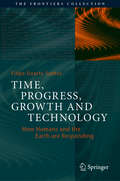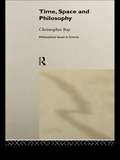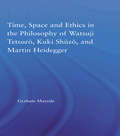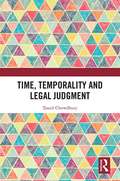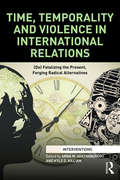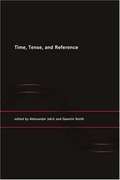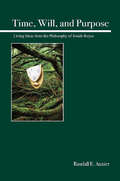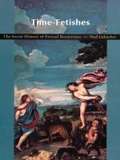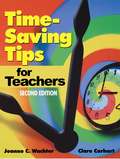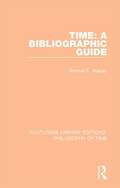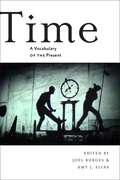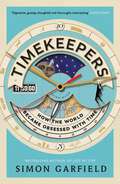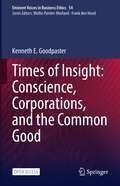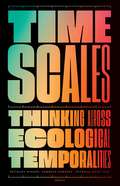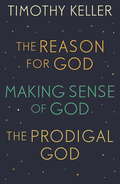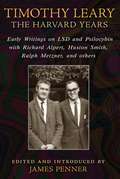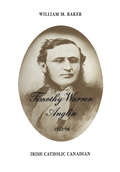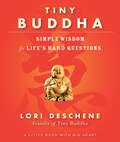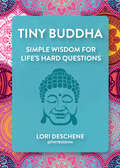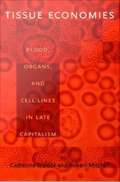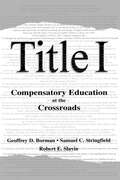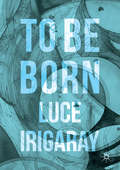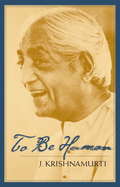- Table View
- List View
Time, Progress, Growth and Technology: How Humans and the Earth are Responding (The Frontiers Collection)
by Filipe Duarte SantosThis book addresses the current challenges of sustainable development, including its social, economic and environmental components. The author argues that we need to develop a new concept of time based on inter-generational solidarity, which focuses both on the long- and the short term. The evolution of man's notions of time are analyzed from prehistory to modern times, showing how these concepts shape our worldviews, our ecological paradigms and our equilibrium with our planet. Practical approaches to dealing with the major medium- and long term sustainability challenges of the 21st century are presented and discussed. This is a thought provoking and timely book that addresses the main global socioeconomic and environmental challenges facing the current and future generations, using science-based analysis and perspectives. It presents an historical narrative of the advent of progress, economic growth and technology, and discusses the structural changes needed to co-create sustainable pathways. It provides hope for our future on Earth, mankind’s common home. António Guterres, Secretary-General of the United Nations This is an amazing, almost mind-boggling book. The author takes a look at the true whole, i.e., the development of the human enterprise since its very beginning. This enterprise is evidently a possibility under the boundary conditions of cosmological dynamics and natural evolution, but evidently also a highly improbable one. It is all but a miracle that the Earth system in its present form exists and happens to support a technical civilization. Will this civilization last long, will it transform itself into something even more exceptional, or will it perish in disgrace?Santos dares to address these grandest of all questions, equipped with a unique transdisciplinary wisdom drawing on physics, cybernetics, geology, biology, economics, anthropology, history, and philosophy. And he dares to dive into the deepest abysses of thinking, where categorial monsters like time and progress lurk. Thereby, he takes us on fascinating journey, during which we perceive and grasp things we have never seen and understood before. One of the best essays I have ever read. John Schellnhuber, founding director of the Potsdam Institute for Climate Impact Research (PIK) and former chair of the German Advisory Council on Global Change
Time, Space and Philosophy (Philosophical Issues in Science)
by Christopher RayThis book provides a comprehensive, up-to-date and accessible introduction to the philosophy of space and time. Ray considers in detail the central questions of space and time which arizse from the ideas of Zeno, Newton, Mach, Leibniz and Einstein. Time, Space and Philosophy extends the debate in many areas:absolute simultaneity is examined as well as black holes, the big bang and even time travel. Time, Space and Philosophy will be invaluable to the student of philosophy and science and will be of considerable interest to mathematics students. The clear, non-technical approach should also make it suitable to for the general reader.
Time, Space, and Ethics in the Thought of Martin Heidegger, Watsuji Tetsuro, and Kuki Shuzo
by Graham MayedaIn this book, Graham Mayeda demonstrates how Watsuji Tetsuro and Kuki Shuzo, two twentieth-century Japanese philosophers, criticize and interpret Heideggerian philosophy, articulating traditional Japanese ethics in a modern idiom.
Time, Temporality and Legal Judgment
by Tanzil ChowdhuryThis book challenges the correspondence theory of judicial fact construction – that legal rules resemble and subsume facts ‘out there’ – and instead provides an account of judicial fact construction through legally produced times- or adjudicative temporalities- that structure legal subject and event formation in legal judgement.Drawing on Bergsonian and Gadamerian theories of time, this book details how certain adjudicative temporalities can produce fully willed and autonomous subjects through ‘time framed’ legal events – in effect, the paradigmatic liberal legal subject – or how alternative adjudicative temporalities may structure legal subjects that are situated and constituted by social structures. The consequences of this novel account of legal judgement are fourfold. The first is that judicial fact construction is not exclusively determined by the legal rule (s) but by adjudication’s production of temporalities. The second is that the selection between different adjudicative temporalities is generally indeterminate, though influenced by wider social structures. As will be argued, social structures, framed as a particular type of past produced by certain adjudicative temporalities, may either be incorporated in the rendering of the legal event or elided. The third is that, with the book’s focus on criminal law, different deployments of adjudicative temporalities effect responsibility ascription. Finally, it is argued that the demystification of time as that which structures event and subject formation reveals another way in which to uncover the politics of legal judgement and the potential for its transformative potential, through either its inclusion or its elision of social structures in adjudication’s determination of facts.This book will be of interest to students and scholars in the field of legal judgement, legal theory and jurisprudence.
Time, Temporality and Violence in International Relations: (De)fatalizing the Present, Forging Radical Alternatives (Interventions)
by Kyle D. Killian Anna M. AgathangelouTime transforms the way we see world politics and insinuates itself into the ways we act. In this groundbreaking volume, Agathangelou and Killian bring together scholars from a range of disciplines to tackle time and temporality in international relations. The authors – critical theorists, artists, and poets – theorize and speak from the vantage point of the anticolonial, postcolonial, and decolonial event. They investigate an array of experiences and structures of violence – oppression, neocolonization, slavery, war, poverty and exploitation – focusing on the tensions produced by histories of slavery and colonization and disrupting dominant modes of how we understand present times. This edited volume takes IR in a new direction, defatalizing the ways in which we think about dominant narratives of violence, ‘peace’ and ‘liberation’, and renewing what it means to decolonize today’s world. It challenges us to confront violence and suffering and articulates another way to think the world, arguing for an understanding of the ‘present’ as a vulnerable space through which radically different temporal experiences appear. And it calls for a disruption of the "everyday politics of expediency" in the guise of neoliberalism and security. This volume reorients the ethical and political assumptions that affectively, imaginatively, and practically captivate us, simultaneously unsettling the familiar, but dubious, promises of a modernity that decimates political life. Re-animating an international political, the authors evoke people’s struggles and movements that are neither about redemption nor erasure, but a suspension of time for radical new beginnings.
Time, Tense, and Reference
by Aleksandar Jokic Quentin SmithAmong the many branches of philosophy, the philosophy of time and the philosophy of language are more intimately interconnected than most, yet their practitioners have long pursued independent paths. This book helps to bridge the gap between the two groups.
Time, Will, and Purpose: Living Ideas from the Philosophy of Josiah Royce
by Randall E. AuxierJosiah Royce (1855-1916) has had a major influence on American intellectual life - both popular movements and cutting-edge thought - but his name often went unmentioned while his ideas marched forward. <P><P>The leading American proponent of absolute idealism, Royce has come back into fashion in recent years. With several important new books appearing, the formation of a Josiah Royce Society, and the re-organization of the Royce papers at Harvard, the time is ripe for Time, Will, and Purpose. Randall Auxier delves into the primary texts written by Royce to retrieve the most poignant ideas, the ideas we need most in the present day, while he also offers a new framework for understanding the development of Royce's philosophy. Auxier responds to everything that has been written about Royce, both early and recent.
Time-Fetishes: The Secret History of Eternal Recurrence
by Ned LukacherFor over two and a half millennia human beings have attempted to invent strategies to "discover" the truth of time, to determine whether time is infinite, whether eternity is the infinite duration of a continuous present, or whether it too rises and falls with the cycles of universal creation and destruction. Time-Fetishes recounts the history of a tradition that runs counter to the dominant tradition in Western metaphysics, which has sought to purify eternity of its temporal character. From the pre-Socratics to Ovid and Plotinus, and from Shakespeare to Hegel, Schelling, Nietzsche, Heidegger, and Derrida, Time-Fetishes traces the secret tradition of the idea of eternal recurrence and situates it as the grounding thought of Western philosophy and literature. The thinkers in this counter-history of the eternal return lingered long enough on the question of time to learn how to resist separating eternity from time, and how to reflect on the possible identity of time and eternity as a way of resisting all prior metaphysical determinations. Drawing out the implications of Nietzsche's reinvention of the doctrine of return, Lukacher ranges across a broad spectrum of ancient and modern thinkers. Shakespeare's role in this history as the "poet of time" is particularly significant, for not only does Shakespeare reactivate the pre-Christian arguments of eternal return, he regards them, and all arguments and images concerning the essence of time and Being, from an inimitably ironic perspective. As he makes transitions from literature to philosophy and psychoanalysis, Lukacher displays a theoretical imagination and historical vision that bring to the forefront a host of pre- and post-Christian texts in order to decipher in them an encounter with the thought of eternal recurrence that has been too long buried under layers of rigid metaphysical interpretation.
Time-Saving Tips for Teachers (1-off Ser.)
by Joanne C. Wachter Clare CarhartPerfect for teachers who need help managing their time,Time Saving Tips for Teachers is structured for easy use. Flip through the chapters and apply the ideas that fit immediate needs and style—and includes more than sixty reproducible forms that can be used right away, covering student and parent information, reading and writing coaches, homework, standards for assignments, and supplies, just to name a few. New tips include portfolios, substitute teachers, email, handheld computers, and the Internet!Chapters provide ideas on how to save time without diminishing quality by:Communicating effectively—but brieflyManaging materialsPlanning the week aheadLearning to say "No"Using the Internet to save timeWorking with substitutes and volunteersCreating a filing system that saves timeAvoiding distractionsTreating yourself as a professionalThis guide helps teachers work smarter and enjoy life outside of teaching once again!
Time: A Bibliographic Guide (Routledge Library Editions: Philosophy of Time #3)
by Samuel L. MaceyOriginally published in 1991. A multidisciplinary guide in the form of a bibliography of selected time-related books and articles divided into 25 existing academic disciplines and about 100 subdisciplines which have a wide application to time studies.
Time: A Vocabulary of the Present
by Joel Burges Amy J. EliasThe critical condition and historical motivation behind Time Studies The concept of time in the post-millennial age is undergoing a radical rethinking within the humanities. Time: A Vocabulary of the Present newly theorizes our experiences of time in relation to developments in post-1945 cultural theory and arts practices. Wide ranging and theoretically provocative, the volume introduces readers to cutting-edge temporal conceptualizations and investigates what exactly constitutes the scope of time studies.Featuring twenty essays that reveal what we talk about when we talk about time today, especially in the areas of history, measurement, and culture, each essay pairs two keywords to explore the tension and nuances between them, from “past/future” and “anticipation/unexpected” to “extinction/adaptation” and “serial/simultaneous.” Moving beyond the truisms of postmodernism, the collection newly theorizes the meanings of temporality in relationship to aesthetic, cultural, technological, and economic developments in the postwar period. This book thus assumes that time—not space, as the postmoderns had it—is central to the contemporary period, and that through it we can come to terms with what contemporaneity can be for human beings caught up in the historical present. In the end, Time reveals that the present is a cultural matrix in which overlapping temporalities condition and compete for our attention. Thus each pair of terms presents two temporalities, yielding a generative account of the time, or times, in which we live.
Timekeepers: How the World Became Obsessed with Time
by Simon GarfieldBy the bestselling author of Just My Type: a &“thoroughly enjoyable and illuminating&” journey into the concept of time &“stuffed with fascinating material&” (Observer, UK).Timekeepers is a book about our obsession with time and our desire to measure it, control it, sell it, film it, perform it, immortalize it and make it meaningful. In this fascinating, anecdotal exploration, award-winning author Simon Garfield has two simple intentions: to tell some illuminating stories, and to ask whether we have all gone completely nuts. Here, Garfield explores the nature of time through stories such as: the Beatles learning to be brilliant in an hour and a half; an Englishman arriving back from Calcutta, refusing to adjust his watch; Beethoven&’s symphonic wishes being ignored; a US Senator&’s speech that goes for 25 hours; the horrors of war frozen at the click of a camera; a woman who designs a ten-hour clock and reinvents the calendar; Roger Bannister living out the same four minutes over a lifetime; and a who prince attempts to stop time in its tracks.&“Digressive, gossipy, thoughtful and thoroughly entertaining.&”—The Sunday Times, UK
Times of Insight: Conscience, Corporations, and the Common Good (Issues in Business Ethics #54)
by Kenneth E. GoodpasterThis open access book traces the research and teaching contributions of Kenneth Goodpaster over more than 45 years of his career. The book shows the content and the progression of these themes over the years identifying four insights in applied ethics: the moral insight, the institutional insight, the anthropological insight, and the Socratic insight. It highlights such concepts as conscience, corporate responsibility, corporations as agents and as recipients, stockholders, stakeholders, comprehensive moral thinking, and ethics education. In addition, Goodpaster explains phrases such as teleopathy, moral projection, human dignity, and the common good. Finally, the book examines with concern the implications of the foregoing for the polarizing and partisan trends in contemporary business behavior.Kenneth Goodpaster’s new book, Times of Insight: Conscience, Corporations, and the Common Good reflects the culmination of 50 years of incredible philosophical insights forming the basis of business ethics. His concept of ‘corporate conscience’ as a moral projection from individual conscience to organizational behavior is both an original as well as a most worthwhile approach to organizational responsibility. Coupling that with a clear notion of the common good, Goodpaster provides substantive grounds for a creative analysis of ethical issues in business. This is one of the most exciting new books in the field. - Patricia H. Werhane, Professor Emerita, University of Virginia and Professor Emerita, DePaul University. "Beginners beware. “Wickedly interdisciplinary” describes corporate ethics. More than “interdisciplinary,” the field asks questions that range across disciplines, nations and centuries. Who better to cut this Gordian Knot than Ken Goodpaster, a true giant in the field, who mixes a prodigious knowledge of contemporary corporations with a deep understanding of intellectual history to produce a new and stunning amalgam. A must-read." - Thomas Donaldson, The Mark O. Winkelman Professor, The Wharton School, University of Pennsylvania As one of the pioneers in business ethics, Kenneth Goodpaster has given us a great gift of synthesizing 50 years of philosophical reflection and corporate practice on some of the most important questions and issues for business today. This work is not nostalgia, but an important source of wisdom for leaders today and into the future. - Dr. Michael Naughton, Director, Center for Catholic Studies, Koch Chair in Catholic Studies, University of St. Thomas
Timescales: Thinking across Ecological Temporalities
by Bethany Wiggin Carolyn Fornoff Patricia Eunji KimHumanists, scientists, and artists collaborate to address the disjunctive temporalities of ecological crisis In 2016, Antarctica&’s Totten Glacier, formed some 34 million years ago, detached from its bedrock, melted from the bottom by warming ocean waters. For the editors of Timescales, this event captures the disjunctive temporalities of our era&’s—the Anthropocene&’s—ecological crises: the rapid and accelerating degradation of our planet&’s life-supporting environment established slowly over millennia. They contend that, to represent and respond to these crises (i.e., climate change, rising sea levels, ocean acidification, species extinction, and biodiversity loss) requires reframing time itself, making more visible the relationship between past, present, and future, and between a human life span and the planet&’s. Timescales&’ collection of lively and thought-provoking essays puts oceanographers, geophysicists, geologists, and anthropologists into conversation with literary scholars, art historians, and archaeologists. Together forging new intellectual spaces, they explore the relationship between geological deep time and historical particularity, between ecological crises and cultural expression, between environmental policy and social constructions, between restoration ecology and future imaginaries, and between constructive pessimism and radical (and actionable) hope. Interspersed among these essays are three complementary &“etudes,&” in which artists describe experimental works that explore the various timescales of ecological crisis. Contributors: Jason Bell, Harvard Law School; Iemanjá Brown, College of Wooster; Beatriz Cortez, California State U, Northridge; Wai Chee Dimock, Yale U; Jane E. Dmochowski, U of Pennsylvania; David A. D. Evans, Yale U; Kate Farquhar; Marcia Ferguson, U of Pennsylvania; Ömür Harmanşah, U of Illinois at Chicago; Troy Herion; Mimi Lien; Mary Mattingly; Paul Mitchell, U of Pennsylvania; Frank Pavia, California Institute of Technology; Dan Rothenberg; Jennifer E. Telesca, Pratt Institute; Charles M. Tung, Seattle U.
Timothy Keller: The Reason for God, Making Sense of God and The Prodigal God
by Timothy KellerThe Reason for God: this book has been written for believers and non-believers, sceptics and churchgoers, and charts a brilliantly considered and impassioned path to Christianity - a Mere Christianity for the twenty-first century.Making Sense of God: a prequel to Keller's A Reason for God: a thoughtful look at the role faith and religion can play in modern lives. The Prodigal God: focused on Jesus' best-known parable - the prodigal son - as a paradigm for the central messages of Christianity: grace, hope and salvation.
Timothy Leary: Early Writings on LSD and Psilocybin with Richard Alpert, Huston Smith, Ralph Metzner, and others
by James PennerThe first collection of Leary’s writings devoted entirely to the research phase of his career, 1960 to 1965 • Presents Leary’s early scientific articles and scholarly essays, including those on the Harvard Psilocybin Project, the Concord Prison Project, and the Good Friday Experiment • With an editor’s introduction that examines the Harvard Drug Scandal in detail as well as a critical preface for each essay On May 27, 1963, Dr. Timothy Leary and Dr. Richard Alpert were dismissed from Harvard University’s Psychology Department--a watershed event marking the moment when psychedelic drugs were publicly demonized and driven underground. Today, little is known about the period in the early 1960s when LSD and psilocybin were not only legal but also actively researched at universities. Presenting the first collection of Leary’s writings devoted entirely to the research phase of his career, 1960 to 1965, this book offers rare articles from Leary’s time as a professor in Harvard’s Psychology Department, including writings from the Harvard Psilocybin Project, the Concord Prison Project, and the Good Friday Experiment. These essays--coauthored with Richard Alpert, Huston Smith, Ralph Metzner, and other psychedelic research visionaries--explore the nature of creativity and the therapeutic, spiritual, and religious aspects of psilocybin and LSD. Featuring Leary’s scientific articles and a rare account of his therapeutic approach, “On Existential Transaction Theory,” the book also includes Leary’s final essay from his time at Harvard, “The Politics of Consciousness,” as well as controversial articles published shortly after his dismissal. With an editor’s introduction examining the Harvard Drug Scandal and a critical preface to each essay, this book of seminal early writings by Leary--appearing in unabridged form--shows why he quickly became an articulate spokesperson for consciousness expansion and an iconic figure for the generation that came of age in the 1960s.
Timothy Warren Anglin: 1822-96
by William BakerBorn in Ireland in 1822, Timothy Warren emigrated to New Brunswick in 1849 and quickly became involved in the life and politics of the city of Saint John and the colony. As founder and editor of the newspaper the Freeman, he came lay spokesman for the large, mainly lower-class Irish Catholic population in Saint John, supporting its attempts to alleviate the poverty and harshness of life in New Brunswick and voicing its desire to be accepted as a responsible part of the community. Although Anglin shared his countrymen's resentment of the British presence in Ireland, he saw Britain's role in North America as a positive one. Both as a newspaperman and later as a practicing politician he pressed for the constitutional and non-violent redress of grievances. His Irish background and sympathies coupled with his moderate political stance and strongly middle class outlook made him an effective mediator between the Irish Catholics in New Brunswick and the rest of the community. In the 1860s Anglin was an active participant in the complex political manoeuvrings in New Brunswick, the Freeman providing a platform for his strenuous opposition to Confederation. Although the anti-Confederates were unsuccessful, Anglin's career provides insight into both the muddy politics of Confederation and the process of adjustment to the new order. Ultimately the union that Anglin had opposed won his loyalty, a demonstration of the fact that, despite its problems, the strength of the new nation of Canada was considerable. He was a member of the Canadian House of Commons from 1867 to 1882 and Speaker of the House from 1874 to 1878. This study of the public career of Timothy Warren Anglin--newspaperman, politician, Irish Catholic leader--sheds light on the political and social history of British North America in the second half of the nineteenth century and on the emergence and growth of the Canadian nation.
Tiny Buddha: Simple Wisdom for Life's Hard Questions
by Lori DescheneA little book of timeless wisdom by the founder of TinyBuddha.com: An &“engaging, thought-provoking book&” that explores life&’s biggest questions (Gretchen Rubin, author of The Happiness Project). What is the meaning of life? Why are relationships so hard? What does it take to be happy? The answers to these and life&’s other questions are explored in author Lori Deschene&’s Tiny Buddha. In 2008, Deschene began asking life&’s biggest questions on Twitter. The many insights that came flooding back to her became the starting point for this uniquely modern guide to life&’s most ancient mysteries. Through the process of engagement, research, and personal reflection, Deschene learned that these questions unite us. And while no one answer is right for everyone, the simultaneous lack and abundance of answers is the answer. Tiny Buddha combines many of the responses Deschene received with her own insightful essays and lessons from wise teachers throughout time, as well as practical tips and exercises to help you bring more meaning and intention to your life. Deschene also shares her own experiences overcoming depression, isolation, self-loathing, and a sense of meaninglessness. The result is a guide that helps readers discover the endless possibilities of a life lived mindfully in the present, connected to others.
Tiny Buddha: Simple Wisdom for Life's Hard Questions
by Lori DescheneMeaningful Answers to Hard Questions “Tiny Buddha is a moving and insightful synthesis of evocative stories and ancient wisdom applied to modern life. A great read!” — Jonathan Fields, author of UncertaintyFrom the mind behind TinyBuddha.com, Lori Deschene brings us the latest edition of her guide to peace, purpose, joy, and more! Exploring the challenging questions we all have to answer for ourselves, Tiny Buddha can be your handbook to personal fulfillment.You are in control of your purpose. Life has a way of giving us more questions than answers. And despite our many differences, we all ask ourselves the same things, starting with: Why am I here? Featuring varied perspectives from Twitter followers around the world, Tiny Buddha can help us choose the meaning behind our existence and find purpose in our pain, no matter how deep.Uncertainty can be a good thing. Offering straightforward, practical advice and pieces of her own personal journey, author Lori Deschene breaks down hard yet revealing questions about life, love, happiness, and change. We may have very few concrete answers, but that means we each get to decide for ourselves what it all means and what happiness looks like for us. Let Tiny Buddha help you create and honor that vision.Inside, you’ll find:The difference between searching for meaning versus creating it ourselvesEmpowering ways to answer the question “What is happiness?” and how to create itThe importance of accepting your struggles without fully understanding the “why”How to find mental freedom by letting go of controlIf you like self-help books or advice blogs, or if you enjoyed Living on Purpose, The Soul’s Human Experience, or The Tao of Influence, then you’ll love Tiny Buddha.
Tissue Economies: Blood, Organs, and Cell Lines in Late Capitalism
by Robert Mitchell Catherine WaldbyAs new medical technologies are developed, more and more human tissues--such as skin, bones, heart valves, embryos, and stem cell lines--are stored and distributed for therapeutic and research purposes. The accelerating circulation of human tissue fragments raises profound social and ethical concerns related to who donates or sells bodily tissue, who receives it, and who profits--or does not--from the transaction. Catherine Waldby and Robert Mitchell survey the rapidly expanding economies of exchange in human tissue, explaining the complex questions raised and suggesting likely developments. Comparing contemporary tissue economies in the United Kingdom and United States, they explore and complicate the distinction that has dominated practice and policy for several decades: the distinction between tissue as a gift to be exchanged in a transaction separate from the commercial market and tissue as a commodity to be traded for profit. Waldby and Mitchell pull together a prodigious amount of research--involving policy reports and scientific papers, operating manuals, legal decisions, interviews, journalism, and Congressional testimony--to offer a series of case studies based on particular forms of tissue exchange. They examine the effect of threats of contamination--from HIV and other pathogens--on blood banks' understandings of the gift/commodity relationship; the growth of autologous economies, in which individuals bank their tissues for their own use; the creation of the United Kingdom's Stem Cell bank, which facilitates the donation of embryos for stem cell development; and the legal and financial repercussions of designating some tissues "hospital waste. " They also consider the impact of different models of biotechnology patents on tissue economies and the relationship between experimental therapies to regenerate damaged or degenerated tissues and calls for a legal, for-profit market in organs. Ultimately, Waldby and Mitchell conclude that scientific technologies, the globalization of tissue exchange, and recent anthropological, sociological, and legal thinking have blurred any strict line separating donations from the incursion of market values into tissue economies.
Titelblätter, Titelkupfer, Frontispize: Bucheröffnungen von "Narrenschiff" bis "Alice im Wunderland"
by Henning OttmannWer Hobbes‘ Leviathan in Händen hält und findet das Titelblatt nicht, ist mit recht enttäuscht. Henning Ottmann widmet sich in diesem Buch den Frontispizen und Titelblättern, die über mehrere Jahrhunderte hinweg wichtige Bestandteile der Paratexte von Büchern waren. Sie können etwas verraten über die Intention des Autors, über Inhalt und Selbstrepräsentation, sie sind Ausdruck einer Lust am Rätsel, sie dienten aber auch als Selbstschutz in Zeiten von Zensur sowie der Übermittlung geheimer Botschaften, die nicht in Worte gefasst werden konnten. Der Künstler selbst kann als erster Leser des Werkes die weitere Rezeption durch seine Interpretation maßgeblich beeinflussen. Bisher gibt es keine systematische Erforschung, keine Kataloge, Handbücher oder nach Fächern gegliederte Datenbanken. Dieses Buch unternimmt nun einen ersten Schritt in diese Richtung und beschränkt sich dabei nicht auf eine Disziplin. Das mag wie ein Potpourri erscheinen – soll aber einfach Lust an mehr wecken! – Mit zahlreichen, zum Teil farbigen Abbildungen.
Title I: Compensatory Education at the Crossroads (Sociocultural, Political, and Historical Studies in Education)
by Robert E. Slavin Samuel C. Stringfield Geoffrey D. BormanThe authors present evidence and theory that explain the positive trend for Title I effects and the recent leveling of this trend in program outcomes. They document the finding that Title I has had a modest positive impact on student achievement.
Title and Deed / Oh, the Humanity and other good intentions
by Will Eno"A haunting and often fiercely funny meditation on life as a state of permanent exile... The marvel of Mr. Eno's voice is how naturally it combines a carefully sculptured lyricism with sly, poker-faced humor. Everyday phrases and familiar platitudes-'Don't ever change,' 'Who knows'-are turned inside out or twisted into blunt, unexpected punch lines punctuating long rhapsodic passages that leave you happily word-drunk." -Charles Isherwood, New York Times on Title and Deed"Title and Deed is daring within its masquerade of the mundane, spectacular within its minimalism and hilarious within its display of po-faced bewilderment. It is a clown play that capers at the edge of the abyss... Eno's voice is unique; his play is stage poetry of a high order. You can't see the ideas coming in Title and Deed. When they arrive-tiptoeing in with a quiet yet startling energy-you don't quite know how they got there. In this tale's brilliant telling, it is not the narrator who proves unreliable but life itself. The unspoken message of Eno's smart, bleak musings seems to be: enjoy the nothingness while you can." -John Lahr, New Yorker"Eno is a supreme monologist, using a distinctive, edgy blend of non sequiturs and provisional statements to explore the fragility of our existence... There are a lot of words, but they are always exquisitely chosen... Oh, the Humanity reveals that we are beautiful walking tragedies blinking with absurd optimism into the camera lens of history." -Lyn Gardner, GuardianKnown for his wry humor and deeply moving plays, Will Eno's "gift for articulating life's absurd beauty and its no less absurd horrors may be unmatched among writers of his generation" (New York Times). This new volume of the acclaimed playwright's work includes five short plays about being alive-Behold the Coach, in a Blazer, Uninsured; Ladies and Gentlemen, the Rain; Enter the Spokeswoman, Gently; The Bully Composition; and Oh, the Humanity-as well as Title and Deed, a haunting and severely funny solo rumination on life as everlasting exile.WILL ENO is a fellow of Residency Five at Signature Theatre Company in New York. His play The Open House premiered at Signature in 2014, and received an Obie Award, the Lucille Lortel Award for Best Play, and a Drama Desk Special Award. His play The Realistic Joneses premiered at Yale Repertory Theatre in 2012, and was produced on Broadway in 2014, for which he and the cast received a Drama Desk Special Award. His play Title and Deed premiered at Signature in 2012 and was presented at the Edinburgh Fringe Festival in 2014. Both Title and Deed and The Realistic Joneses were included in the New York Times Best Plays List of 2012. Gnit, an adaption of Ibsen's Peer Gynt, premiered at Actors Theatre of Louisville in 2013. Middletown, winner of the Horton Foote Prize, premiered at the Vineyard Theatre in New York in 2010, and was then produced at Steppenwolf Theatre Company in Chicago in 2011. Thom Pain (based on nothing) was a finalist for the 2005 Pulitzer Prize and has been translated into many languages. The Flu Season premiered at the Gate Theatre in London in 2003, and later received the Oppenheimer Award for best New York debut production by an American writer. Tragedy: a tragedy premiered at the Gate Theatre in 2001, and was subsequently produced by Berkeley Repertory Theatre in 2008. Mr. Eno lives in Brooklyn with his wife Maria Dizzia and their daughter Albertine.
To Be Born: Genesis of a New Human Being
by Luce Irigaray“According to the words of Phaedrus in the Symposium of Plato, Love, sometimes named Eros, has no parents, no age, no history, and its origin remains unknown to anyone. Love, whose destiny is said to be unique amongst the gods and humans, perhaps embodies desire for a conjunction always in search of its happening. Love would represent a dynamism longing for the copula incarnating the transcendence of our being. As such, Love would remain the everlasting yearning for the accomplishment of the ecstatic destiny of humanity.” In this book, Luce Irigaray - philosopher, linguist, psychologist and psychoanalyst - proposes nothing less than a new way of conceiving what a human being is as well as a means to ensure our individual and relational development from birth. Unveiling the mystery of our origin is probably what most motivates our quests and plans. And yet such a disclosure proves to be impossible. Indeed we were born as one from a union between two, and we are forever deprived of an origin of our own. Hence our ceaseless search for roots: in our genealogy, in the place where we were born, in our culture, religion or language. But a human being cannot develop from its own roots as a tree does. As humans, we must take responsibility for our own being and existence without any given continuity with our origin and background. How can we achieve that? First by cultivating our breathing, which is more than a means to come into the world and to exist; breathing also allows us to transcend mere survival to secure for ourselves a spiritual becoming. Taking on our sexuate belonging is the second element which enables us to assume our natural existence. Indeed, this determination at once brings us energy and provides us with a structure which contributes to our individuation and our relations with other living beings and the world. Our sexuation can compensate for our absence of roots too by compelling us to unite with the other sex so that we freely approach the copulative conjunction from which we were born; that is, the mystery of our origin. This does not occur through a mere sexual instinct or drive, but requires us to cultivate desire and love with respect for our mutual difference(s). In this way we can give rise to a new human being, not only at a natural but also at an ontological level.
To Be Human
by Jiddu KrishnamurtiTo Be Human presents Krishnamurti's radical vision of life in a new way. At the heart of this extraordinary collection are passages from the great teacher's talks that amplify and clarify the nature of truth and those obstacles that often prevent us from seeing it. Most of these core teachings have not been available in print until now. Besides presenting the core of Krishnamurti's message, the book alerts the reader to his innovative use of language, the ways in which he would use "old words with new interpretations," then gives practical examples, showing that we can clarify our understanding of life itself--and act on this new understanding. The splendid introduction by David Skitt discusses Krishnamurti's philosophy as a guide to knowledge and experience, the roles knowledge and experience should play in our lives, and the times when it is best to cast them aside and "look and act anew." The book's source notes will aid the inquisitive reader who wishes a deeper understanding of this great teacher's message.
